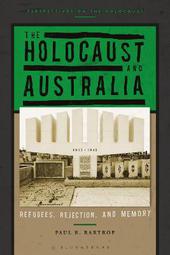
|
The Holocaust and Australia: Refugees, Rejection, and Memory
Hardback
Main Details
| Title |
The Holocaust and Australia: Refugees, Rejection, and Memory
|
| Authors and Contributors |
By (author) Professor Paul R. Bartrop
|
| Series | Perspectives on the Holocaust |
|---|
| Physical Properties |
| Format:Hardback | | Pages:296 | | Dimensions(mm): Height 234,Width 156 |
|
| Category/Genre | Australia, New Zealand & Pacific history
The Holocaust |
|---|
| ISBN/Barcode |
9781350185142
|
| Classifications | Dewey:940.53/18 |
|---|
| Audience | | Tertiary Education (US: College) | |
|---|
| Illustrations |
20 bw illus
|
|
Publishing Details |
| Publisher |
Bloomsbury Publishing PLC
|
| Imprint |
Bloomsbury Academic
|
| Publication Date |
25 August 2022 |
| Publication Country |
United Kingdom
|
Description
Paul R. Bartrop examines the formation and execution of Australian government policy towards European Jews during the Holocaust period, revealing that Australia did not have an established refugee policy (as opposed to an immigration policy) until late 1938. He shows that, following the Evian Conference of July 1938, Interior Minister John McEwen pledged a new policy of accepting 15,000 refugees (not specifically Jewish), but the bureaucracy cynically sought to restrict Jewish entry despite McEwen's lofty ambitions. Moreover, the book considers the (largely negative) popular attitudes toward Jewish immigrants in Australia, looking at how these views were manifested in the press and in letters to the Department of the Interior. The Holocaust and Australia grapples with how, when the Second World War broke out, questions of security were exploited as the means to further exclude Jewish refugees, a policy incongruous alongside government pronouncements condemning Nazi atrocities. The book also reflects on the double standard applied towards refugees who were Jewish and those who were not, as shown through the refusal of the government to accept 90% of Jewish applications before the war. During the war years this double standard continued, as Australia said it was not accepting foreign immigrants while taking in those it deemed to be acceptable for the war effort. Incorporating the voices of the Holocaust refugees themselves and placing the country's response in the wider contexts of both national and international history in the decades that have followed, Paul R. Bartrop provides a peerless Australian perspective on one of the most catastrophic episodes in world history.
Author Biography
Paul R. Bartrop is Professor Emeritus at Florida Gulf Coast University, USA. He is the author and co-author of several books, including Resisting the Holocaust: Upstanders, Partisans, and Survivors (2016), Encountering Genocide: Personal Accounts from Victims, Perpetrators, and Witnesses (2014) and Genocide: The Basics (2014). He is also the co-editor, along with Samuel Totten, of The Genocide Studies Reader (2009) and the four-volume Modern Genocide: The Definitive Resource and Document Collection (2014; co-edited with Steven Leonard Jacobs). Professor Bartrop is currently Vice-President of the Midwest Jewish Studies Association, and is a Past President of the Australian Association of Jewish Studies.
ReviewsThe scholarship of Paul Bartop, one of the most prolific of Genocide and Holocaust scholars, never ceases to provide insight into often underexamined dimensions of the Holocaust. In The Holocaust and Australia, Bartrop continues that tradition by shifting his lens from Europe to Australia and powerfully succeeds in illustrating the ways in which the Nazi persecution of the Jews had worldwide implications and consequences. I highly recommend this book as an essential read for anyone interested understanding the ways in which the Holocaust was a global calamity the consequences of which continue to influence and haunt our world today. * Alexander Alvarez, Professor, Department of Criminology and Criminal Justice, North Arizona University, USA * In this vital book, Paul R. Bartrop expertly takes us from the opening threats of the Nazi regime, through the genocide, to the Holocaust's aftermath in courts and memories, carefully outlining Australia's response. He skilfully sets out the reasons why Australia rejected Jewish refugees, showing the behind-the-scenes discussions and machinations of government. We read devastating stories of what Australia's lack of action meant for the lives and futures of so many Jews. Traversing the records of government bureaucracy, media coverage, and the letters that Jews wrote begging for assistance, Bartrop reminds us of the ways that Australian governments have historically closed their borders, refusing to offer protection to people desperately in need. It's a timely reminder of a long history in this country, and Bartrop shows clearly the importance of his meticulous historical work for illuminating this past. This is a book which we all need to read, to remember the dangers of governments 'selecting' who their populations will be. * Dr Jordana Silverstein, Senior Research Fellow, Melbourne Law School, The University of Melbourne, Australia *
|